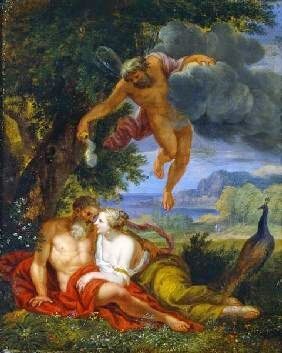The Shrine of Hypnos
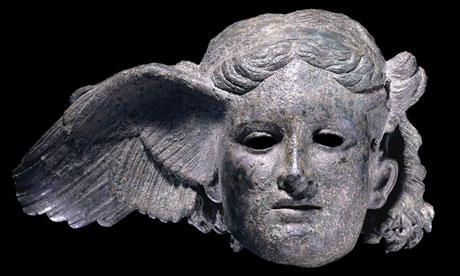
“Divine Hypnos, god who knows no pain,
Hypnos, stranger to anguish,
come in favor to us, come happy,
and giving happiness, great King!
Keep before his eyes such light as is spread before them now.
Come to him, I pray you, come with power to heal!”
Sophocles, Philoctetes (409 B.C.)
No, not a new age cult. The Scottish physician James Braid named hypnosis (an abbreviation from ‘neuro-hypnosis' after Hypnos, the Greek god of sleep (Latin name: Somnus).
It is difficult to track down images and text fragments relating to Hypnos so we decided to collect them here: our Shrine to Hypnos!
“O, Hypnos,
divine repose of all things!
Gentlest of the deities!
Peace to the troubled mind,
from which you drive the cares of life.
Restorer of men's strength
when wearied with the toils of day.”
Ovid, Metamorphoses, Book XI (1 A.D.)
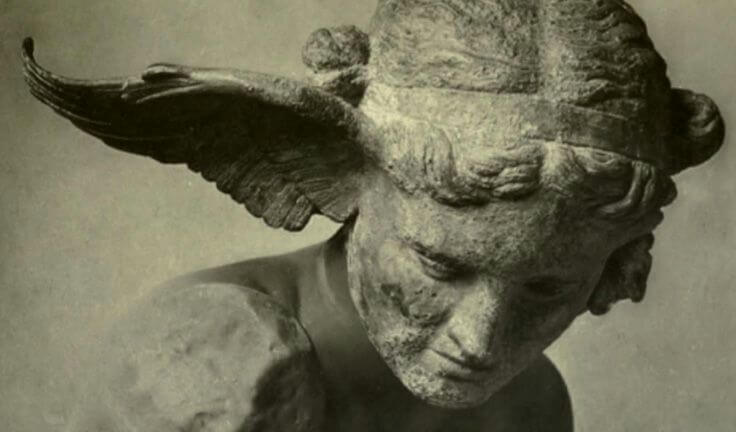
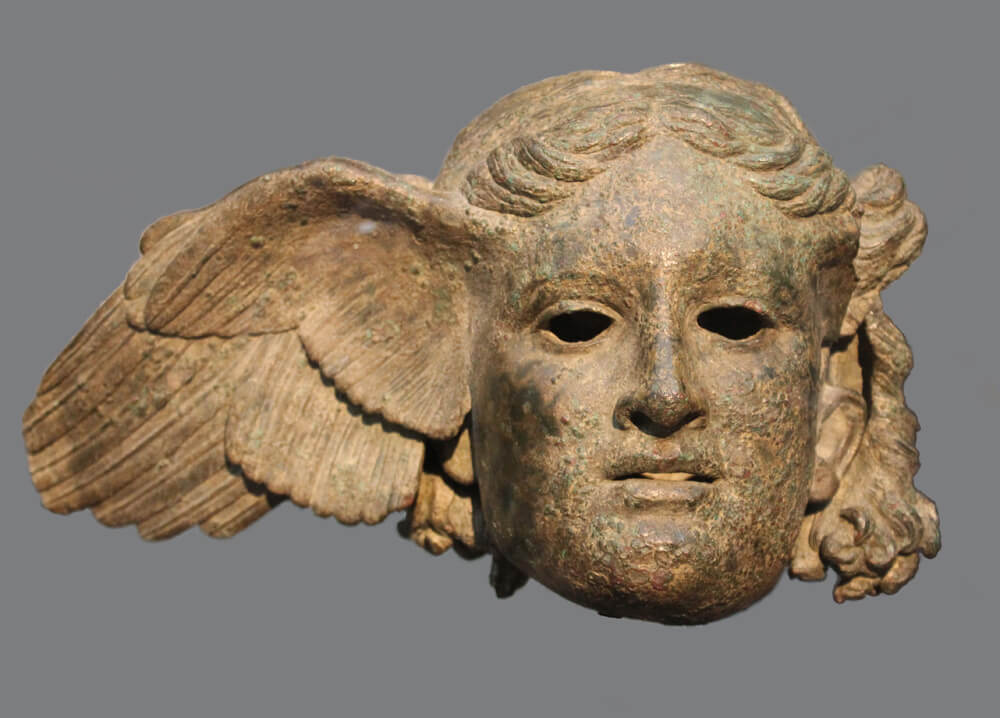
The Greek Myth of Hypnos
Hypnos was one of the many relatively minor and very ancient deities of the Greek pantheon. The similarities in appearance and behaviour between the god of Sleep and Hermes (Latin: Mercury) are so apparent, however, that it is compelling to speculate that the two are linked, or that Hypnos is in some way a particular aspect of Hermes. Hermes, also considered a god of sleep, was one of the major Olympian gods and appeared later than Hypnos, it is probable that as Greek civilisation developed the minor, rural deities were absorbed into the official Olympian pantheon in this way.
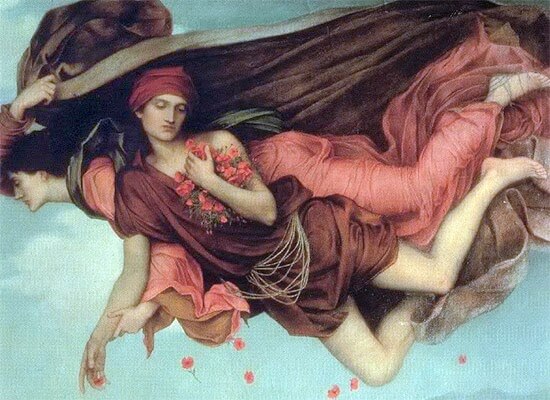
Hypnos the Bountiful, as he was known by the ancients, rests in the arms of his mother Nyx (Night). His father is Erebus, the pure darkness of Hades, the Underworld. Hypnos dwells with his twin brother Thanatos, god of Death, in a dark cave by the banks of the river Lethe (Oblivion), at the entrance to Hades. The cave is surrounded by opium poppies and other sleep-inducing herbs.
Hypnos is a gentle and benevolent god who sometimes takes the form of a singing bird, sometimes that of a winged youth or old man. He carries a drinking horn, from which he pours sleep-inducing opium. He is most beloved of the Muses, and his spouse is Pasithea, one of the Charities. Together they have three children, Morpheus, Phobetor, and Phantasus who occupy the dreams of men. Morpheus appears in human form in our dreams, Phobetor as birds and animals, and Phantasus as all the animate objects of our dreams.
Hypnos delivers mortals from pain and mental suffering, with the help of his sons and his brother Oniros (Dream) he colours their sleep with dreams. Hypnos opens two gates, the Gates of Horn and Ivory, through which Oniros comes into the minds of men. Through the Gates of Horn come prophetic dreams, and through the Gates of Ivory come deceptive dreams which mislead. His brother is Thanatos, God of Peaceful Death.
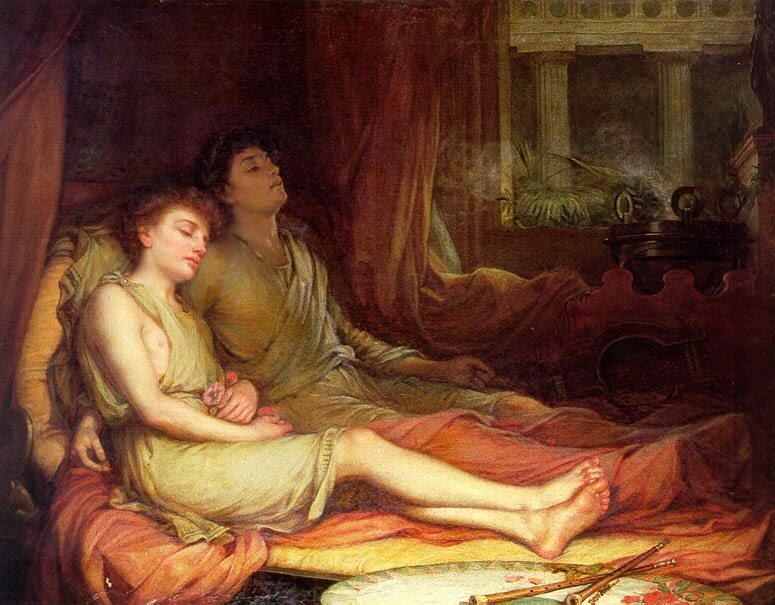
The House of Somnus
Near the Cymmerians, in his dark abode,
Deep in a cavern, dwells the drowzy God;
Whose gloomy mansion nor the rising sun,
Nor setting, visits, nor the lightsome noon;
But lazy vapours round the region fly,
Perpetual twilight, and a doubtful sky:
No crowing cock does there his wings display,
Nor with his horny bill provoke the day;
Nor watchful dogs, nor the more wakeful geese,
Disturb with nightly noise the sacred peace;
Nor beast of Nature, nor the tame are nigh,
Nor trees with tempests rock'd, nor human cry;
But safe repose without an air of breath
Dwells here, and a dumb quiet next to death.
An arm of Lethe, with a gentle flow
Arising upwards from the rock below,
The palace moats, and o'er the pebbles creeps,
And with soft murmurs calls the coming sleeps.
Around its entry nodding poppies grow,
And all cool simples that sweet rest bestow;
Night from the plants their sleepy virtue drains,
And passing, sheds it on the silent plains:
No door there was th' unguarded house to keep,
On creaking hinges turn'd, to break his sleep.
But in the gloomy court was rais'd a bed,
Stuff'd with black plumes, and on an ebon-sted:
Black was the cov'ring too, where lay the God,
And slept supine, his limbs display'd abroad:
About his head fantastick visions fly,
Which various images of things supply,
And mock their forms; the leaves on trees not more,
Nor bearded ears in fields, nor sands upon the shore.
Ovid, Metamorphoses, Book XI (1 A.D.)
“To Hypnos (Sleep), Fumigation from Poppies. Hypnos, king of Gods, and men of mortal birth, sovereign of all, sustained by mother earth; for thy dominion is supreme alone, over all extended, and by all things known. ‘Tis thine all bodies with benignant mind in other bands than those of brass to bind. Tamer of cares, to weary toil repose, and from whom sacred solace in affliction flows. Thy pleasing gentle chains preserve the soul, and even the dreadful cares of death control; for Thanatos (Death), and Lethe (Forgetfulness) with oblivious stream, mankind thy genuine brothers justly deem. With favouring aspect to my prayer incline, and save thy mystics in their works divine.” – Orphic Hymn 85 to Hypnos
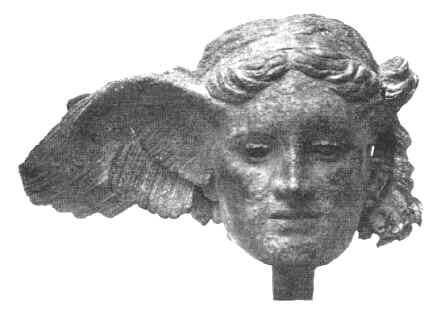
HYPNOS GOD OF SLEEP
“[Nyx] carries Hypnos (Sleep) in her arms, and he is Thanatos' (Death's) brother … And there [near the house of Nyx in the underworld] the children of gloomy Nyx have their houses. These are Hypnos and Thanatos, dread divinities. Never upon them does Helios, the shining sun, cast the light of his eye-beams, neither when he goes up the sky nor comes down from it. One of these, across the earth and the wide sea-ridges, goes his way quietly back and forth, and is kind to mortals, but the heart of the other one is iron, and brazen feelings without pity are inside his breast.” – Hesiod, Theogony 758
“Soft-eyed Hypnos (Sleep) came, embracing all his limbs, as a mother on seeing her dear son after a long absence folds him with her wings to her loving breast.” – Greek Lyric V Anonymous, Fragments 929g
http://degodhypno.blogspot.co.uk/
During the Trojan War, Hera wanted to distract Zeus from the battle so she could help the Akhaians. She asked Hypnos to cast a spell of sleepiness on Zeus, but Hypnos was not agree. Hera offered Hypnos a golden throne, however she raised the offering when Hypnos reminded her of the only time he had dared cast sleep on Zeus. For this new deception, Hypnos made Hera swear oaths of sincerity. He agreed to help her deceive Zeus for the hand of Pasithea, one of the Graces. He turned himself into a bird and, before Zeus could see him, hid in the top of the trees on Mount Ida. He stayed hidden until Hera had seduced Zeus. While Zeus was heavy and dreamy with pleasure and sleep, Hypnos went to Poseidon and told him to increase his efforts in helping the Akhaians because Zeus was asleep. Poseidon went through the ranks of soldiers and urged them on. His bellowing and screeching woke up Zeus, but too late! The Akhaians had turned the battle back on the Trojans. Hera’s trick had worked. Zeus never found out that Hypnos had betrayed him.
